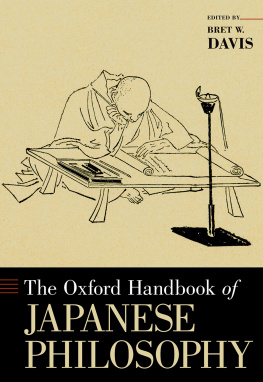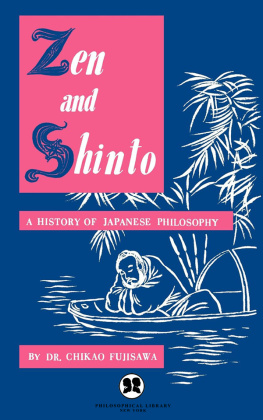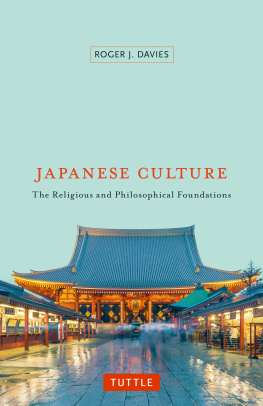THE OXFORD HANDBOOK OF
JAPANESE PHILOSOPHY

Oxford University Press is a department of the University of Oxford. It furthers the Universitys objective of excellence in research, scholarship, and education by publishing worldwide. Oxford is a registered trade mark of Oxford University Press in the UK and certain other countries.
Published in the United States of America by Oxford University Press
198 Madison Avenue, New York, NY 10016, United States of America.
Oxford University Press 2020
All rights reserved. No part of this publication may be reproduced, stored in a retrieval system, or transmitted, in any form or by any means, without the prior permission in writing of Oxford University Press, or as expressly permitted by law, by license, or under terms agreed with the appropriate reproduction rights organization. Inquiries concerning reproduction outside the scope of the above should be sent to the Rights Department, Oxford University Press, at the address above.
You must not circulate this work in any other form and you must impose this same condition on any acquirer.
CIP data is on file at the Library of Congress
ISBN 9780199945726
eISBN9780190068967
For Toshi and Koto, always
Contents
Introduction:
Bret W. Davis
Thomas P. Kasulis
Iwasawa Tomoko
Peter Flueckiger
Paul L. Swanson and Brook Ziporyn
John W. M. Krummel
Dennis Hirota
Mark Unno
Bret W. Davis
Steven Heine
Victor Sgen Hori
Mori Tetsur (trans. Bret W. Davis), Minobe Hitoshi (trans. Bret W. Davis), and Steven Heine
John A. Tucker
John A. Tucker
Chris Goto-Jones
John C. Maraldo
hashi Rysuke and Akitomi Katsuya (trans. Bret W. Davis)
Fujita Masakatsu (trans. Bret W. Davis)
John C. Maraldo
James W. Heisig
Melissa Anne-Marie Curley
Graham Parkes
Steffen Dll
Erin McCarthy
Graham Mayeda
John W. M. Krummel
Terao Kazuyoshi
Shigenori Nagatomo
Rikki Kersten
Michiko Yusa and Leah Kalmanson
Tani Tru
Kobayashi Yasuo
Rolf Elberfeld (trans. Bret W. Davis)
Bret W. Davis
Robert E. Carter
Mara Miller and Yamasaki Kji
Yoko Arisaka
When Peter Ohlin of Oxford University Press first approached me in 2011 about submitting a proposal for this Handbook of Japanese Philosophy, my first thought was that it was indeed high time for such a volume to be produced. The timing was especially fortuitous, given the impending publication of Japanese Philosophy: A Sourcebook (2011), edited by James Heisig, Thomas Kasulis, and John Maraldo, which would for the first time make accessible in a single volume a wide selection of key texts in translation from the entire history of philosophical thinking in Japan. In the belatedly burgeoning field of Japanese philosophy, what was called for next, it seemed to me, was a Handbook that would, in effect, complement the Sourcebook. That is to say, what was called for was a collection of interpretive elucidations and critical engagements with a selection of the most important topics, figures, schools, and texts from the entire history of philosophical thinking in Japan.
My second thought, however, was how daunting the task of producing such a Handbook would be. As I began to envision the range of material that would need to be covered and to draft a table of contents, I quickly realized that the project could be done properly only if I were able to assemble a veritable dream team of contributors. In the end, after just a bit of groveling and arm twisting, almost every one of the scholars I contacted on account of their unparalleled expertise and acumen graciously agreed to collaborate. Although I regret not having been able to include in this project a few other established and upcoming scholars, I am very grateful to those who contributed for carving time out in their busy schedules and for their willingness to work closely with me on what has, I think, turned out to be a remarkably coherent and comprehensive volume. They proved willing to write not just outstanding articles that could each be savored independently but, moreover, articles that were contentiously composed as chapters with the vision of the volume as a whole in mind.
Japanese philosophy is now a flourishing field, with thriving societies, conferences, and journals dedicated to it in North America and Europe as well as in Japannot to mention an ever-growing library of translations, books, and articles. However, it is still a relative newcomer on the academic landscape. In particular, after having long been confined to fields such as Asian Studies and Religious Studies, it is still finding its legs in the field of Philosophy. Accordingly, it seemed exigent to begin this Handbook with an extensive introductory chapter that addresses head-on the many complex and controversial issues enfolded in the deceptively simple question, What is Japanese Philosophy?
One of the main questions addressed in the Introduction is that of the semantic and historical range of Japanese philosophy. Of course, the material presented in the Modern Japanese Philosophies section, which constitutes nearly half the volume, is unquestionably and recognizably philosophical. True, the style of most modern Japanese philosophers may be more familiar to students and scholars trained in the continental rather than analytic tradition since modern Japanese philosophers have typically engaged continental European, especially German, philosophy more than they have Anglo-American analytic philosophy. In any case, no one doubts that modern Japanese philosophy is philosophy.
Potentially controversial, however, is the inclusion of coverage of premodern discourses in this Handbook. Did philosophy exist in Japan prior to the Japanese encounter with and appropriation of Western philosophy in the final decades of the nineteenth century? While this question continues to be debated (and these debates are discussed at length in the Introduction), it is at least incontrovertible that premodern Japanese discourses are replete with profoundly significant sources for philosophical thinking. In other words, the question of whether the writings of Kkai, Shinran, Motoori Norinaga or Ogy Sorai should themselves be called philosophy can be debated; but, regardless of the outcome of that debate, they are unquestionably valuable sources for any contemporary philosopher who wishes to expand his or her horizon beyond the borders of the Western tradition. Western philosophers have long been accustomed to drawing insights and ideas from literature, religious writings, political speeches, and other texts that need not be considered philosophy to be considered philosophically significant. Why limit these sources of philosophy to one tradition? Whether or not the reader is willing to rethink the definition of philosophy in light of premodern Japanese discourses, there can be no doubt that his or her philosophizing will be all the broader and better for having engaged with the discourses discussed in the first half of this Handbookwhich consists of sections on Shint and the Synthetic Nature of Japanese Philosophical Thought, Philosophies of Japanese Buddhism, and Philosophies of Japanese Confucianism and Bushid.
These sections on the philosophical dimensions of premodern Japanese thought are followed by the large section on Modern Japanese Philosophies. After a substantial chapter on the initial decades of the Japanese encounter with and appropriation of Western philosophy, this section is divided into one subsection on the most well-known group of twentieth-century Japanese philosophers, The Kyoto School, and a second subsection on the no less interesting and important array of Other Modern Japanese Philosophies. Rounding out the volume is a section on Pervasive Topics in Japanese Philosophical Thought, which includes topics that span a range of schools and time periods. In this final section, the reader will find chapters on language, nature and freedom, ethics, aesthetics, and a concluding chapter that returns to a key issue first addressed in the Introduction: the controversial cultural identity of Japanese philosophy. The selection of chapter topics is discussed in greater detail at the end of the Introduction. Readers can explore the thematic interconnections among the chapters by consulting the detailed index at the back of this volume.












